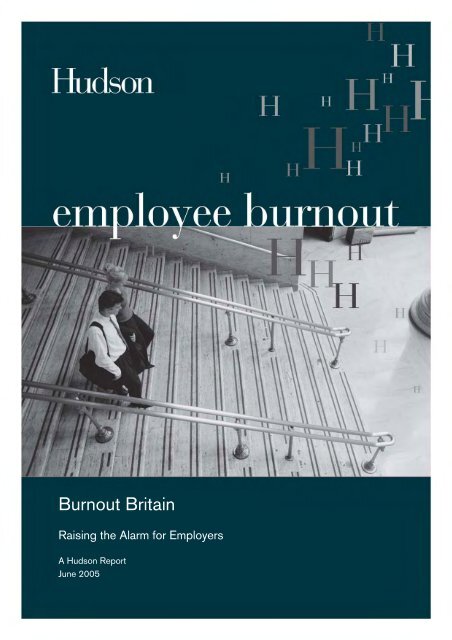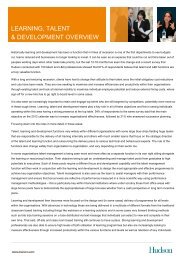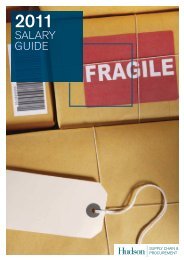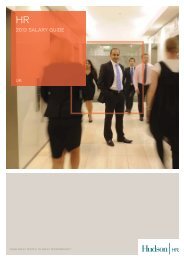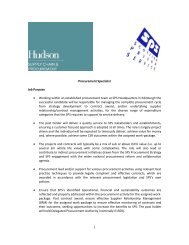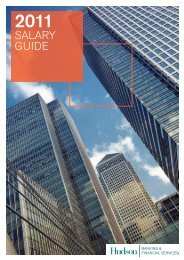Burnout Britain: Raising the Alarm for Employers - Hudson
Burnout Britain: Raising the Alarm for Employers - Hudson
Burnout Britain: Raising the Alarm for Employers - Hudson
You also want an ePaper? Increase the reach of your titles
YUMPU automatically turns print PDFs into web optimized ePapers that Google loves.
<strong>Burnout</strong> <strong>Britain</strong><br />
<strong>Raising</strong> <strong>the</strong> <strong>Alarm</strong> <strong>for</strong> <strong>Employers</strong><br />
A <strong>Hudson</strong> Report<br />
June 2005
1. Executive Summary<br />
2. <strong>Burnout</strong>: Growth and Causes<br />
3. <strong>Burnout</strong>: Role of <strong>Employers</strong><br />
4. <strong>Burnout</strong>: The Employee Experience<br />
5. Managing <strong>Burnout</strong>: Recommendations <strong>for</strong><br />
<strong>Employers</strong> and Employees<br />
6. Conclusion: Prevention is Better Than Cure<br />
7. Appendices<br />
i: Methodology and Sample<br />
ii: Definition of <strong>Burnout</strong><br />
iii: An Hypo<strong>the</strong>tical Example of <strong>Burnout</strong><br />
iv: About <strong>Hudson</strong>/Contact Details
Chapter 1
<strong>Burnout</strong> <strong>Britain</strong>?<br />
<strong>Raising</strong> <strong>the</strong> <strong>Alarm</strong> <strong>for</strong> Employees.<br />
Executive Summary<br />
<strong>Burnout</strong> <strong>Britain</strong> examines awareness and opinion among both UK employers and<br />
employees of employee ‘burnout’ 1 . It <strong>for</strong>ms part of an annual programme of qualitative and<br />
quantitative research conducted by global recruitment and HR consultancy, <strong>Hudson</strong>, looking<br />
at issues and trends affecting <strong>the</strong> modern workplace. The increase in severe workplace<br />
stress, and <strong>the</strong> impact of worker fatigue on wider business per<strong>for</strong>mance and talent retention,<br />
has become an increasing cause <strong>for</strong> concern amongst both employers and employees.<br />
The report revealed a widespread acceptance among employers and employees that <strong>the</strong><br />
phenomenon of burnout is real and present in <strong>the</strong> current UK working environment.<br />
Moreover, not only is it clear that burnout is prevalent among UK workers, <strong>the</strong> problem is<br />
also getting worse, with both employers and employees recognising an increase in extreme<br />
workplace stress and fatigue in recent years.<br />
In terms of <strong>the</strong> causes of this rise, both employers and employees blamed a more<br />
competitive and fast-paced business environment. ‘The increased pace of business life’ and<br />
‘an increased competitive environment’ were cited as <strong>the</strong> key reasons behind <strong>the</strong> increase,<br />
in addition to a ‘decrease in <strong>the</strong> number of employees to do <strong>the</strong> same amount of work’.<br />
The increase in burnout has made a tangible impact on working life, <strong>for</strong> both employers and<br />
workers. For <strong>the</strong> <strong>for</strong>mer, <strong>the</strong> implications of burnout are more than simply a reduction in<br />
productivity and increasing absenteeism. The research reveals employers increasingly feel<br />
burnout is affecting <strong>the</strong>ir bottom line by contributing to a loss of talent and damaging<br />
corporate reputation and ultimately profitability.<br />
<strong>Burnout</strong> differs from stress in that it causes people who have previously been highly committed to <strong>the</strong>ir<br />
work to become disillusioned, losing all interest and motivation. Sufferers face physical, emotional<br />
and mental exhaustion, a sense of reduced personal achievement and a lack of concern <strong>for</strong> customers<br />
and clients, experienced by almost one in six (15%) employees surveyed by <strong>Hudson</strong>. Definition of<br />
burnout sourced from <strong>Hudson</strong> experts and Mind Tools. For more in<strong>for</strong>mation, go to<br />
www.mindtools.com.
<strong>Burnout</strong> <strong>Britain</strong>?<br />
<strong>Raising</strong> <strong>the</strong> <strong>Alarm</strong> <strong>for</strong> Employees.<br />
And more personally, employers <strong>the</strong>mselves are also feeling <strong>the</strong> affects directly with more<br />
than a third stating burnout had happened to one or more colleagues.<br />
For an employee, <strong>the</strong> implications of burnout can be far-reaching. Its impact extends to <strong>the</strong>ir<br />
own health, sense of well-being and overall attitude to <strong>the</strong>ir jobs and career. Although <strong>the</strong><br />
research revealed <strong>the</strong> numbers of employees currently experiencing full burnout are low, a<br />
significant proportion of workers are experiencing typical symptoms or displaying worrying<br />
levels of workplace apathy and disinterest, including loss of sleep, emotional exhaustion and<br />
high stress levels.<br />
Yet, despite being unanimous in <strong>the</strong>ir acknowledgement that burnout exists and <strong>the</strong> problem<br />
is worsening, employers still tend to only deal with <strong>the</strong> issue on a largely reactive basis with<br />
many employers simply not having any <strong>for</strong>mal process in place <strong>for</strong> helping an employee who<br />
had suffered from burnout; still less actively encourage <strong>the</strong>ir staff to work fewer hours.<br />
Many workers simply do not believe <strong>the</strong>ir employer had taken measures to address issues<br />
of increased workload and pressure. For that reason, <strong>the</strong> research revealed an apparent<br />
underlying discrepancy between what employers claim to be doing and what <strong>the</strong>y are<br />
actually seen to be doing by employees; one which could prove costly <strong>for</strong> employers and<br />
workers alike.<br />
Key findings<br />
• More than half (52%) of <strong>Britain</strong>’s employees claim to have experienced one or more<br />
symptoms of over-work or burnout in <strong>the</strong> last six months<br />
• One in two employees (49%) and employers (46%) thought <strong>the</strong> situation had<br />
worsened in <strong>the</strong> last five years<br />
• 4% of employees believed <strong>the</strong>y were burned out or near to burnout. A fur<strong>the</strong>r 8% said<br />
<strong>the</strong>y rarely enjoyed <strong>the</strong>ir work and were stressed most of <strong>the</strong> time.<br />
• Employees (76%) and employers (78%) were most likely to believe that <strong>the</strong> increased<br />
pace of business life was a cause of burnout.
<strong>Burnout</strong> <strong>Britain</strong>?<br />
<strong>Raising</strong> <strong>the</strong> <strong>Alarm</strong> <strong>for</strong> Employees.<br />
Key findings Contd.<br />
• 52% of employees and 35% of employers believe that burnout had happened to one<br />
or more colleagues.<br />
• One in seven (14%) of <strong>the</strong> HR managers interviewed have lost one or more members<br />
of staff due to burnout<br />
• Over a third of employers (36%) have witnessed a decline in productivity and <strong>the</strong> vast<br />
majority (79%) report an increase in <strong>the</strong> number of sick days being taken<br />
• 59% of employers have no <strong>for</strong>mal process in place <strong>for</strong> helping an employee who is<br />
suffering from burnout (falling to just 30% amongst smaller employers)<br />
• More than a third (35%) of employees are concerned that <strong>the</strong>ir employers have made<br />
no attempts to address increased workloads<br />
• One third of employees (31%) have experienced physical or emotional exhaustion in<br />
<strong>the</strong> last six months and 26% suffered loss of sleep or illness due to worrying about<br />
work.<br />
What is clear from <strong>the</strong> report: prevention is better than cure. <strong>Employers</strong> need to consider<br />
new measures and protocol <strong>for</strong> identifying burnout be<strong>for</strong>e it happens, and offer employees<br />
new means of managing stress and fatigue. The research showed that many are already<br />
taking steps to provide confidential advice and web-based support, but too few workers feel<br />
<strong>the</strong>ir employers are taking an active interest in <strong>the</strong>ir welfare.<br />
What should employers do to prevent burnout?<br />
• Build better support networks <strong>for</strong> employees<br />
• Increase clarity around role and delivery expectations, and revisit job design <strong>for</strong><br />
roles where burnout is common<br />
• Help employees build additional skills to enable <strong>the</strong>m to per<strong>for</strong>m <strong>the</strong>ir job more<br />
efficiently<br />
• Give clearer out-of-hours expectations<br />
• Encourage employees to work fewer hours<br />
• Recruit more employees to deal with permanent and/or temporary workload<br />
increases<br />
• Don’t just deal with situations as <strong>the</strong>y arise.
Chapter 2
<strong>Burnout</strong> <strong>Britain</strong>?<br />
<strong>Raising</strong> <strong>the</strong> <strong>Alarm</strong> <strong>for</strong> Employees.<br />
Introduction<br />
To analyse <strong>the</strong> causes, prevalence and impact of burnout in more detail, research was<br />
carried out amongst 505 employees and 501 employers spanning a range of sectors,<br />
business sizes and regions. Employees were of middle management level, with employers<br />
represented by HR managers and directors.<br />
The following definition of burnout was read to all research respondents prior to questioning:<br />
“A state of physical, emotional and mental exhaustion caused by involvement in demanding<br />
situations in <strong>the</strong> workplace and prolonged exposure to stress and long hours. <strong>Burnout</strong><br />
occurs when people who have previously been highly committed to <strong>the</strong>ir work become<br />
disillusioned, losing all interest and motivation. The road to burnout can be a long one, with<br />
symptoms increasing gradually in intensity and frequency over a period of many months<br />
and, occasionally, years.”<br />
<strong>Burnout</strong>: Growth and Causes<br />
Prevalence in <strong>the</strong> workplace<br />
The report revealed a widespread acceptance among employers and employees that <strong>the</strong><br />
phenomenon of burnout, as defined above, is real and present in <strong>the</strong> current UK working<br />
environment. More than 96% of employees and 92% of employers acknowledged its<br />
existence. Employees <strong>the</strong>mselves are conscious of burnout in <strong>the</strong>ir own workplaces and<br />
industries - 74% believe it exists within <strong>the</strong>ir business sector, and more than half (52%)<br />
within <strong>the</strong>ir own organisation.<br />
As far as employers are concerned, whilst 92% also believed burnout exists as a<br />
real workplace issue, far fewer (just 35%) admit to it being a problem within <strong>the</strong>ir<br />
own company (compared to 52% of employees), and only 54% believe it exists<br />
within <strong>the</strong>ir sector.
<strong>Burnout</strong> <strong>Britain</strong>?<br />
<strong>Raising</strong> <strong>the</strong> <strong>Alarm</strong> <strong>for</strong> Employees.<br />
For both employers and employees, recognition of burnout was common across all sectors<br />
with little variation. Employees engaged in accountancy (81%), technology, media and<br />
telecommunications (80%) and financial services (77%) were more likely to believe burnout<br />
existed within <strong>the</strong>ir sector. While employees working in manufacturing & engineering (66%)<br />
and marketing, advertising and sales (68%) were less likely to be believe burnout existed in<br />
<strong>the</strong>ir sector.<br />
<strong>Employers</strong> in <strong>the</strong> public and third sectors (62%) and financial services (61%) were most<br />
likely to believe burnout existed within <strong>the</strong> sector and marketing, advertising, PR and sales<br />
employers were least likely (42%). <strong>Employers</strong> in financial services (46%) and <strong>the</strong> public<br />
and third sectors (44%) were also most likely to believe burnout existed specifically within<br />
<strong>the</strong>ir organisation, whereas accountancy (21%) and TMT (24%) employers were least likely<br />
to believe burnout had happened among <strong>the</strong>ir own staff.<br />
Fig.1 Belief that burnout exists<br />
Employees and employers believing<br />
burnout exists<br />
Proportion of<br />
employees<br />
Proportion of<br />
employers<br />
In <strong>the</strong> UK 96% 92%<br />
In <strong>the</strong>ir business sector 74% 54%<br />
In <strong>the</strong>ir organisation 52% 35%<br />
Bases: All employees/employers
<strong>Burnout</strong> <strong>Britain</strong>?<br />
<strong>Raising</strong> <strong>the</strong> <strong>Alarm</strong> <strong>for</strong> Employees.<br />
Fig.1 Belief that burnout exists contd.<br />
Employees believing burnout exists within <strong>the</strong>ir<br />
organisation by sector<br />
Proportion of employees<br />
Public Sector / Third Sector 68%<br />
Legal 59%<br />
TMT 59%<br />
Financial Services 55%<br />
Retail/FMCG/Leisure/Travel. 53%<br />
Construction/ Property 50%<br />
Manufacturing/Engineering. 48%<br />
Marketing/Ad/PR/Sales 44%<br />
Accountancy 32%<br />
Base:<br />
All employees<br />
The presence and awareness of burnout does, however, vary according to <strong>the</strong> size of <strong>the</strong><br />
organisation. Employees in larger businesses were somewhat more likely to believe that<br />
burnout existed in <strong>the</strong>ir organisation with 70% of those working in an organisation of more<br />
than 500 employees believing it was present. This falls to 60% <strong>for</strong> those in organisations<br />
with between 201 and 500 employees, 43% <strong>for</strong> those with 101 to 200 colleagues and 45%<br />
of those with between 50 and 100 co-workers.
<strong>Burnout</strong> <strong>Britain</strong>?<br />
<strong>Raising</strong> <strong>the</strong> <strong>Alarm</strong> <strong>for</strong> Employees.<br />
Similarly, employers in larger organisations were <strong>the</strong> most likely to believe burnout existed<br />
among <strong>the</strong>ir own colleagues, with 43% of employers with more than 500 staff recognising<br />
burnout among <strong>the</strong>ir work<strong>for</strong>ce, compared to 29% among those with between 50 and 100<br />
staff.<br />
Increase in incidence of burnout<br />
Not only is burnout prevalent among UK workers, <strong>the</strong> problem is also getting worse, with<br />
both employers and employees recognising an increase in extreme workplace stress and<br />
fatigue in recent years. Almost half of all employees (49%) and employers (46%) who<br />
acknowledged that burnout existed said that, in <strong>the</strong>ir opinion, <strong>the</strong> situation had worsened in<br />
<strong>the</strong> last five years. Only 15% of employees thought it had improved and a fur<strong>the</strong>r third<br />
believed <strong>the</strong> situation had remained <strong>the</strong> same. <strong>Employers</strong> were in agreement, with 46%<br />
stating <strong>the</strong> problem had got worse in <strong>the</strong> last five years, 34% <strong>the</strong> same and 15% better.<br />
Older employees, in particular, have noticed an increase in workplace stress levels, with<br />
55% of those aged over 35 believing it had worsened in recent years, compared to just 43%<br />
of those aged 35 and under.<br />
Causes<br />
Responses from both employers and employees were very much in agreement on <strong>the</strong><br />
perceived causes of burnout, blaming a more competitive and fast-paced business<br />
environment.<br />
‘The increased pace of business life’ was regarded as <strong>the</strong> most important factor causing<br />
burnout by 76% of employees and 78% of employers, followed closely by an ‘increased<br />
competitive environment.’ 70% of employees also pointed towards a ‘decrease in <strong>the</strong><br />
number of employees to do <strong>the</strong> same amount of work’.<br />
Only one third (27%) identified ‘colleagues’ use of flexible working arrangements’ and<br />
‘increased globalisation of working practices’ (37%) as factors encouraging burnout.
<strong>Burnout</strong> <strong>Britain</strong>?<br />
<strong>Raising</strong> <strong>the</strong> <strong>Alarm</strong> <strong>for</strong> Employees.<br />
Fig 2. Causes of burnout<br />
Main causes of burnout<br />
[Major factor + Factor responses]<br />
Proportion of<br />
employees<br />
Proportion of<br />
employers<br />
Increased pace of business life and demands 76% 78%<br />
Increased competitive environment 71% 67%<br />
Decrease in number of employees to do <strong>the</strong><br />
same amount of work<br />
Increased requirement <strong>for</strong> 24/7 availability and<br />
response<br />
Increased worry that problems will arise in an<br />
employee's absence<br />
70% 63%<br />
66% 65%<br />
57% 49%<br />
Increased use of fast-response technology,<br />
such as email, PDAs, mobile phone, voicemail, 56% 57%<br />
Blackberry<br />
Increased globalisation of working practices<br />
(e.g. requirement to deal with offices in<br />
different time zones)<br />
37% 33%<br />
Colleagues' use of flexible working<br />
arrangements<br />
27% 26%<br />
Bases: All employees/employers believing burnout exists<br />
Relatively few employees viewed advances in technology and 24/7 accessibility as<br />
a catalyst <strong>for</strong> burnout, aside from older employees (aged over 46), over two thirds<br />
of which (69%) viewed ‘increased use of fast-response technology’ as a cause of<br />
burnout compared to just one in two (50%) of <strong>the</strong>ir colleagues aged 35 and under.
Chapter 3
<strong>Burnout</strong> <strong>Britain</strong>?<br />
<strong>Raising</strong> <strong>the</strong> <strong>Alarm</strong> <strong>for</strong> Employees.<br />
<strong>Burnout</strong>: Role of <strong>Employers</strong><br />
Impact of burnout<br />
When it comes to examining how burnout manifests itself in <strong>the</strong> workplace, <strong>the</strong> implications<br />
<strong>for</strong> employers are more than simply reduction in productivity and increasing absenteeism.<br />
<strong>Employers</strong> increasingly feel burnout is affecting <strong>the</strong>ir bottom line by contributing to a loss of<br />
talent and damage to corporate reputation and profitability. One quarter of larger<br />
organisations (more than 500 employees) recalled losing one or more members of staff as<br />
a result of burnout.<br />
More than a third of employers (35%) stated burnout had happened to one or more<br />
colleagues and 15% believed that burnout had directly affected business profits and/or <strong>the</strong>ir<br />
corporate reputation. One in seven (14%) of HR managers interviewed have lost one or<br />
more members of staff due to burnout, with 36% witnessing a decline in productivity and<br />
79% reporting an increase in <strong>the</strong> number of sick days being taken.<br />
When asked to rank <strong>the</strong> five key indicators of employee burnout, 45% of employers<br />
believed that an increase in <strong>the</strong> number of sick days being taken was <strong>the</strong> most important<br />
indicator of approaching employee burnout. The least likely indication of employee burnout<br />
(5%) was ‘more employees downshifting careers’.<br />
Fig 3. Signs of burnout<br />
Signs of burnout observed in work<strong>for</strong>ce<br />
Average rank score<br />
Base: All employees [1 = most important]<br />
Increased number of sick days taken 1.9<br />
Increased number of employees taking time off <strong>for</strong> stressrelated<br />
reasons<br />
2.6<br />
Declining levels of productivity 3.0<br />
Increased number of employees leaving <strong>the</strong> organisation 3.2<br />
More employees downshifting careers 4.4
<strong>Burnout</strong> <strong>Britain</strong>?<br />
<strong>Raising</strong> <strong>the</strong> <strong>Alarm</strong> <strong>for</strong> Employees.<br />
Addressing pressures and workload<br />
Despite being unanimous in <strong>the</strong>ir acknowledgement that burnout exists and <strong>the</strong> problem is<br />
worsening, employers tend to deal with <strong>the</strong> issue mainly reactively. More than half of<br />
employers (59%) do not have any <strong>for</strong>mal process in place <strong>for</strong> helping an employee who<br />
had suffered from burnout, choosing instead to deal with <strong>the</strong> situation on a case-by-case<br />
basis. Only one in five (19%) actively encourage <strong>the</strong>ir staff to work fewer hours.<br />
This has not gone unrecognised by employees. One in three (35%) employees believed<br />
<strong>the</strong>ir employer had not taken measures to address issues of increased workload and<br />
pressure. The smaller <strong>the</strong> company, <strong>the</strong> less likely it is such processes will be established.<br />
Almost half (47%) of employees of smaller companies felt <strong>the</strong>y didn’t have sufficient<br />
measures in place, compared to just 26% of those working in organisations with more than<br />
100 staff.<br />
The research revealed a discrepancy between what employers claim to be doing and what<br />
<strong>the</strong>y are actually seen to be doing by employees. Among employers, 79% believed <strong>the</strong>y<br />
had taken measures to address increased pressures and workload, increasing to 87%<br />
amongst larger employers. The widest disparity between <strong>the</strong> perceptions of employees<br />
and employers was within construction (41% of employees stated that <strong>the</strong>ir employers<br />
had not taken action, but only 6% of employers believed <strong>the</strong>y had not taken action) and law<br />
(28% v. 6%).
<strong>Burnout</strong> <strong>Britain</strong>?<br />
<strong>Raising</strong> <strong>the</strong> <strong>Alarm</strong> <strong>for</strong> Employees.<br />
Fig 4. Addressing increased pressures and workload<br />
Employees and employers believing <strong>the</strong>ir<br />
organisation has not addressed issues of<br />
pressure and workload<br />
Proportion of<br />
employees<br />
Proportion of<br />
employers<br />
Retail/FMCG/Leisure/Travel 47% 32%<br />
Manufacturing /Engineering 43% 26%<br />
Construction/Property 41% 16%<br />
Accountancy 40% 26%<br />
Financial Services 34% 13%<br />
Legal 28% 6%<br />
TMT 27% 16%<br />
Marketing/Ad/PR/Sales 26% 18%<br />
Public Sector/Third Sector 24% 14%<br />
Base:<br />
All employees/employers
<strong>Burnout</strong> <strong>Britain</strong>?<br />
<strong>Raising</strong> <strong>the</strong> <strong>Alarm</strong> <strong>for</strong> Employees.<br />
Treatment and prevention<br />
It is clear that some employers, however, are taking action or creating processes to deal<br />
with burnout:<br />
• 32% provide a confidential advice line<br />
• Almost half (47%) stated that <strong>the</strong>y had recruited more employees to support overburdened<br />
departments or teams<br />
• 70% provide regular training to enable employees to fulfil <strong>the</strong>ir roles<br />
• 67% encourage a healthy balance between work and home life<br />
• 65% provide support <strong>for</strong> employees experiencing stress<br />
• Almost half (49%) would provide counselling or mentoring<br />
• 35% had literature on dealing with burnout and 15% had in<strong>for</strong>mation available over <strong>the</strong><br />
Internet.<br />
Three measures are regarded by almost two-thirds of employers as means of invigorating<br />
staff and preventing burnout among employees. These are:<br />
• Building support networks (69%)<br />
• Increased clarity regarding roles and delivery expectations (66%)<br />
• Assisting employees to build additional skills to help <strong>the</strong>m per<strong>for</strong>m <strong>the</strong>ir job more<br />
efficiently (65%).<br />
Giving employees more time off (27%) and encouraging employees to work fewer hours<br />
(30%) were viewed as <strong>the</strong> least effective means of invigorating staff and preventing burnout.
<strong>Burnout</strong> <strong>Britain</strong>?<br />
<strong>Raising</strong> <strong>the</strong> <strong>Alarm</strong> <strong>for</strong> Employees.<br />
Fig 5. Preventative measures<br />
Actions to invigorate staff and prevent burnout<br />
Build better support networks <strong>for</strong> employees within your<br />
organisation<br />
Proportion of<br />
employers<br />
69%<br />
Increase clarity around role and delivery expectations 66%<br />
Assist employees in building additional skills to help <strong>the</strong>m<br />
per<strong>for</strong>m <strong>the</strong>ir job more efficiently<br />
Provide external career management programmes or training<br />
opportunities<br />
65%<br />
52%<br />
Clearer guidance on out-of-hours expectations in <strong>the</strong>ir roles 49%<br />
Revisit job design <strong>for</strong> roles where burnout is a common<br />
occurrence<br />
Recruit more employees to deal with increased<br />
expectations/workloads<br />
46%<br />
43%<br />
Encourage employees to work fewer hours 30%<br />
Give employees more time off 27%<br />
Base:<br />
All employers
Chapter 4
<strong>Burnout</strong> <strong>Britain</strong>?<br />
<strong>Raising</strong> <strong>the</strong> <strong>Alarm</strong> <strong>for</strong> Employees.<br />
<strong>Burnout</strong>: The Employee Experience<br />
Half (52%) of employees interviewed admitted to having experienced one or more<br />
symptoms of overwork, stress or burnout in <strong>the</strong> past six months, with nearly a third (31%)<br />
experiencing physical or emotional exhaustion. Over half of employees (52%) believe one<br />
or more of <strong>the</strong>ir colleagues has experienced burnout.<br />
Although <strong>the</strong> numbers of employers currently experiencing full burnout are low (only one in<br />
twenty five employees, or 4%, feel <strong>the</strong>y are burnt out or are close to reaching burn out), a<br />
significant proportion of workers are experiencing typical symptoms or displaying worrying<br />
levels of workplace apathy and disinterest.<br />
One in twelve (8%) stated that <strong>the</strong>y rarely enjoyed <strong>the</strong>ir work and are stressed most of <strong>the</strong><br />
time. Only one in ten (11%) said that <strong>the</strong>y are never stressed at work. The situation is<br />
particularly acute within <strong>the</strong> public sector where (63%) of employees have experienced one<br />
or more of <strong>the</strong> symptoms of overwork or burnout.<br />
Employees in marketing, advertising, PR and sales were <strong>the</strong> most likely (14%) to feel<br />
stressed most of <strong>the</strong> time, along with those in manufacturing and engineering. Lawyers and<br />
accountants were <strong>the</strong> least likely to feel stressed all <strong>the</strong> time.<br />
If you are male, aged 45 to 55 and working in <strong>the</strong> South West, you are most likely to<br />
have experienced symptoms of burnout, with 14% of older employers stating <strong>the</strong>y felt<br />
stressed all <strong>the</strong> time and men five times more likely to state <strong>the</strong>y were burnt out and<br />
considering leaving <strong>the</strong>ir employer or <strong>the</strong> industry than women (5% v. 1%).
<strong>Burnout</strong> <strong>Britain</strong>?<br />
<strong>Raising</strong> <strong>the</strong> <strong>Alarm</strong> <strong>for</strong> Employees.<br />
Fig 6. Incidence of burnout<br />
Employees believing burnout exists<br />
Burnt-out or<br />
Stressed<br />
Combined<br />
within <strong>the</strong>ir organisation by sector<br />
close to burn<br />
most of <strong>the</strong><br />
total<br />
out<br />
time<br />
Public Sector/Third Sector 7% 12% 19%<br />
Financial Services 5% 5% 9%<br />
TMT 5% 7% 12%<br />
Retail/FMCG/Leisure/Travel 4% 10% 15%<br />
Accountancy 4% 2% 7%<br />
Legal 4% 0% 4%<br />
Construction/ Property 3% 10% 14%<br />
Marketing/Ad/PR/Sales 2% 14% 16%<br />
Manufacturing/Engineering. 2% 5% 7%<br />
Base:<br />
All employees believing burnout exists<br />
The implications of burnout <strong>for</strong> <strong>the</strong> individual can be far-reaching. Its impact<br />
extends to employees’ health, sense of well-being and overall attitude to <strong>the</strong>ir jobs<br />
and career. Over a quarter of workers (26%) have suffered loss of sleep or illness<br />
directly attributed to worry about <strong>the</strong>ir work. 23% have felt a reduction in <strong>the</strong>ir sense<br />
of personal achievement and 18% have experienced irritation being expressed by<br />
family or friends about <strong>the</strong>ir frequent out-of-hours working. Almost one-in-six (15%)<br />
have experienced a lack of concern towards customers or colleagues and one in<br />
eight (12%) believe <strong>the</strong>y have suffered increased illness which <strong>the</strong>y suspected was<br />
a direct result of being overworked.
Chapter 5
<strong>Burnout</strong> <strong>Britain</strong>?<br />
<strong>Raising</strong> <strong>the</strong> <strong>Alarm</strong> <strong>for</strong> Employees.<br />
Managing <strong>Burnout</strong>: Recommendations <strong>for</strong> <strong>Employers</strong> and Employees<br />
<strong>Burnout</strong> is an acknowledged and growing presence within all elements of <strong>the</strong> UK work<strong>for</strong>ce<br />
with <strong>the</strong> potential to impact significantly on talent retention and employee satisfaction. But<br />
how can employers and employees best prevent burnout and help manage demanding<br />
workloads and rising stress levels?<br />
<strong>Employers</strong><br />
What can your organisation do to prevent burnout among your work<strong>for</strong>ce? <strong>Hudson</strong><br />
recommends <strong>the</strong> following:<br />
1. Build better support networks <strong>for</strong> employees within your organisation.<br />
Some large organisations have a confidential staff helpline. O<strong>the</strong>rs provide staff<br />
with a personal manager who is not <strong>the</strong>ir line manager, enabling employees to<br />
discuss problems with someone who is removed from <strong>the</strong>ir immediate situation.<br />
Consider corporate fitness programmes, health checks and allowing employees to<br />
work from home.<br />
2. Increase clarity around role and delivery expectations.<br />
Feedback should not be left until career review time. Monthly indications on how<br />
employees are per<strong>for</strong>ming should be collected from colleagues or business<br />
partners and relayed, along with constructive suggestions <strong>for</strong> change.<br />
3. Help employees build additional skills to enable <strong>the</strong>m to per<strong>for</strong>m <strong>the</strong>ir job more<br />
efficiently.<br />
Time management and assertiveness training are good all-rounders, and ensure<br />
specific training suited to each employee’s role is conducted annually, at <strong>the</strong> very<br />
least.<br />
4. Give clearer guidance on out-of-hours expectations.<br />
Handing over a Blackberry or mobile phone without giving an indication of how it is<br />
expected to be used can lead to an ‘always on’ mentality.<br />
5. Encourage employees to work fewer hours.<br />
Ensure managers understand that working long hours is not a sign of a strength or<br />
commitment and does not drive productivity. Encourage <strong>the</strong>m to lead by example,<br />
announcing loudly that <strong>the</strong>y are leaving on time, ra<strong>the</strong>r than skulking out guiltily.
<strong>Burnout</strong> <strong>Britain</strong>?<br />
<strong>Raising</strong> <strong>the</strong> <strong>Alarm</strong> <strong>for</strong> Employees.<br />
6. Revisit job design <strong>for</strong> roles where burnout is a common occurrence.<br />
Don’t bury your hand in <strong>the</strong> sand. Think creatively about how pressurised roles<br />
can be restructured. Consider jobsharing, using interim consultants or introducing<br />
more people to a team. Why not involve your employees in <strong>the</strong> redesign of <strong>the</strong>ir<br />
own roles?<br />
7. Recruit more employees to deal with permanent and/or temporary increased<br />
expectations/workloads.<br />
Think ahead – ensure you have a reliable agency on standby to find you good<br />
temporary workers at short notice. Be realistic about <strong>the</strong> total amount of man<br />
hours required to complete a project and <strong>the</strong> number of productive hours <strong>the</strong>re are<br />
in a day.<br />
8. Give employees more time off.<br />
Giving time off costs you less in <strong>the</strong> long run. You could reward good ideas or<br />
clever working with an extra day off or introduce an earlier home time on Fridays.<br />
9. Watch out <strong>for</strong> signs of burnout.<br />
Don’t bury your head in <strong>the</strong> sand. <strong>Burnout</strong> occurs when people who have<br />
previously been highly committed to <strong>the</strong>ir work become disillusioned, losing all<br />
interest and motivation.<br />
10. Don’t just deal with situations as <strong>the</strong>y arise.<br />
Be open with employees about burnout and provide advice and guidance <strong>for</strong><br />
avoiding burnout on your intranet, in newsletters and during mentoring sessions.<br />
Employees<br />
What can you do if you’re suffering or approaching burnout? <strong>Hudson</strong> recommends <strong>the</strong><br />
following:<br />
1. Don’t suffer in silence: talk to your manager or human resources department.<br />
People suffering from burnout assume it’s <strong>the</strong>ir problem and that <strong>the</strong>re is<br />
something wrong with <strong>the</strong>m. When problems are brought into <strong>the</strong> open, remedies<br />
become clearer. Someone outside your situation will be able to identify pressure<br />
points and suggest, or introduce, solutions.<br />
2. Take a holistic view of your situation.<br />
It’s possible that it is not just work that is contributing to burnout. Is your diet good?<br />
Do you exercise regularly? Do you have an external release, a hobby or pastime?<br />
Without outside interests, work can become all-consuming.
<strong>Burnout</strong> <strong>Britain</strong>?<br />
<strong>Raising</strong> <strong>the</strong> <strong>Alarm</strong> <strong>for</strong> Employees.<br />
Employees Contd.<br />
3. Consider seeking support outside of your workplace.<br />
People that may be able to help include friends and family, your doctor or qualified<br />
occupational health professionals.<br />
4. Don’t just take time off from work.<br />
You may need a break, but <strong>the</strong> problems will still be <strong>the</strong>re when you return. Tackle<br />
<strong>the</strong> cause, ra<strong>the</strong>r than applying a temporary sticking plaster.<br />
5. Be clear about what is demanded from you.<br />
If feedback isn’t <strong>for</strong>thcoming, ask <strong>for</strong> it. Don’t wait until review time to discover<br />
what is expected of you.<br />
6. Suggest ways in which your role could be redesigned.<br />
All managers like to be presented with a solution, ra<strong>the</strong>r than a problem. Make a<br />
convincing case <strong>for</strong> how a reorganisation of your role could be beneficial to <strong>the</strong><br />
company.<br />
7. Give yourself designated times to check email.<br />
Make a concerted ef<strong>for</strong>t not to check emails as soon as you see that little envelope<br />
pop up on your screen. Look at emails every half hour or try to go <strong>for</strong> a whole<br />
hour! If it’s that urgent, someone will call you, ra<strong>the</strong>r than send an email. And if<br />
you’ve got a Blackberry, allow yourself to check it no more than once at <strong>the</strong><br />
weekend or evening.<br />
8. Talk to colleagues at your level.<br />
You cannot be <strong>the</strong> only one suffering in this way. Talk to colleagues and find out<br />
how <strong>the</strong>y are feeling. Approaching your boss in a group will make a greater impact.<br />
Or ask colleagues <strong>for</strong> advice on coping with pressure. Some people are better at it<br />
than o<strong>the</strong>rs, so learn from <strong>the</strong>m.<br />
9. Remember, what seems like a crisis now will be a distant memory tomorrow.<br />
Try to recall when you last took a day off work. Did problems arise while you were<br />
away? Yes? Try to delegate be<strong>for</strong>e you go away – and not just in <strong>the</strong> hour be<strong>for</strong>e<br />
you leave <strong>the</strong> office. Get into <strong>the</strong> habit of in<strong>for</strong>ming and including o<strong>the</strong>rs in your<br />
day-to-day work, and you will find <strong>the</strong>y are far more inclined and able to help out<br />
while you are not around.<br />
10. Get into <strong>the</strong> habit of leaving on time at least one night a week.<br />
Once you have left on time a few times, you will realise that <strong>the</strong> world does not stop<br />
without you. And <strong>the</strong>re is a great world out <strong>the</strong>re to be explored after five o’clock…
Chapter 6
<strong>Burnout</strong> <strong>Britain</strong>?<br />
<strong>Raising</strong> <strong>the</strong> <strong>Alarm</strong> <strong>for</strong> Employees.<br />
Conclusion: Prevention is Better than Cure<br />
<strong>Burnout</strong> goes deeper than workplace stress; it constitutes severe emotional, physical and<br />
mental fatigue resulting in a deep-seated disillusionment and disinterest among employees.<br />
Yet, despite <strong>the</strong> severity of <strong>the</strong> condition, a seriousness recognised by UK employers and<br />
employees, it is by no means rare.<br />
The research revealed a consensus among employers and employees alike that burnout is<br />
a growing issue <strong>for</strong> <strong>the</strong> UK work<strong>for</strong>ce and one that businesses can no longer af<strong>for</strong>d to<br />
neglect. <strong>Burnout</strong> has implications beyond <strong>the</strong> individual employee and immediate work<strong>for</strong>ce.<br />
It not only reduces <strong>the</strong> productivity and motivation of <strong>the</strong> current employees, but can also<br />
lead to loss of talent, damage to corporate reputation and, consequently, a reduction in<br />
profits.<br />
Clearly, productivity is an issue <strong>for</strong> employers in a competitive marketplace. However,<br />
working long hours rarely results in greater productivity. In order to hold on to top talent,<br />
companies must address <strong>the</strong> need to work smarter; managers must be more aware of how<br />
effectively staff work and less concerned about <strong>the</strong> number of hours spent at <strong>the</strong>ir desks.<br />
By giving employees <strong>the</strong> right help and in<strong>for</strong>mation, employers can ensure <strong>the</strong>y retain <strong>the</strong>ir<br />
best talent and eliminate <strong>the</strong> impact that burnout can have on <strong>the</strong> bottom line. Equally,<br />
employees need to ask <strong>for</strong> help be<strong>for</strong>e it gets too late and become involved in designing a<br />
more effective and manageable role <strong>for</strong> <strong>the</strong>mselves.
Chapter 7
<strong>Burnout</strong> <strong>Britain</strong>?<br />
<strong>Raising</strong> <strong>the</strong> <strong>Alarm</strong> <strong>for</strong> Employees.<br />
Appendix A: Methodology and Sample<br />
The research was undertaken by The Survey Shop.<br />
Employees<br />
The sample was drawn from a cross-section of UK companies, public sector and third sector<br />
organisations. Quotas were set <strong>for</strong> business sector, Scotland and company size.<br />
Respondents were qualified as having no managerial responsibility or being in middle<br />
management.<br />
Respondents were evenly drawn from nine broad sectors, with 14% from <strong>the</strong> public/third<br />
sector and between 9% and 12% from o<strong>the</strong>r sectors.<br />
Within <strong>the</strong> public/third sector, 17% were from central government, 44% from local<br />
government, 21% from <strong>the</strong> health service and 18% from <strong>the</strong> third sector.<br />
21% worked in organisations with more than 500 employees, 18% had 201 to 500<br />
colleagues, 17% 101 to 200 and 43% 50 to 100.<br />
501 interviews were conducted anonymously by telephone over <strong>the</strong> period 3 rd to 10 th May<br />
2005.
<strong>Burnout</strong> <strong>Britain</strong>?<br />
<strong>Raising</strong> <strong>the</strong> <strong>Alarm</strong> <strong>for</strong> Employees.<br />
<strong>Employers</strong><br />
The sample was drawn from a cross-section of UK companies, public sector and third sector<br />
organisations. Quotas were set <strong>for</strong> business sector, Scotland and company size.<br />
Respondents were qualified as having HR managerial responsibility.<br />
Respondents were evenly drawn from nine broad sectors, with 16% from <strong>the</strong> public/third<br />
sector and between 8 and 13% from o<strong>the</strong>r sectors.<br />
Within <strong>the</strong> public/third sector, 15 were from central government, 36% from local government,<br />
21% from <strong>the</strong> health service and 28% from <strong>the</strong> third sector.<br />
22% worked in organisations with over 500 employees, 16% had 201 to 500 colleagues,<br />
17% 101 to 200 and 45% 50 to 100<br />
505 interviews were conducted anonymously by telephone over <strong>the</strong> period 3 rd to 10 th May<br />
2005.<br />
Appendix B: Definition of <strong>Burnout</strong><br />
<strong>Burnout</strong> differs from stress in that it causes people who have previously been highly<br />
committed to <strong>the</strong>ir work to become disillusioned, losing all interest and motivation. Sufferers<br />
face physical, emotional and mental exhaustion, a sense of reduced personal achievement<br />
and a lack of concern <strong>for</strong> customers and clients, experienced by almost one in six (15%)<br />
employees surveyed by <strong>Hudson</strong>.
<strong>Burnout</strong> <strong>Britain</strong>?<br />
<strong>Raising</strong> <strong>the</strong> <strong>Alarm</strong> <strong>for</strong> Employees.<br />
Appendix C: An Hypo<strong>the</strong>tical Example of <strong>Burnout</strong><br />
I may be a sales manager in a medium-sized division or company. I may not realise that I<br />
am close to, or have actually reached, burnout but I am aware that my world has changed. I<br />
feel swamped by <strong>the</strong> weight of correspondence that descends on me. Despite my<br />
awareness of my internal stakeholders and external customers, I have lost <strong>the</strong> concern that I<br />
previously had <strong>for</strong> <strong>the</strong>se people. Fur<strong>the</strong>r, I am getting less and less satisfaction from what I<br />
achieve and I do not seem able to replenish my energy reserves.<br />
Those around me notice that I am occasionally frustrated and can sometimes appear<br />
apa<strong>the</strong>tic. If my colleagues at work were to ask how I felt, I might say that my ef<strong>for</strong>ts are<br />
unrecognised and unrewarded. At times, emotional distress might even cause physical<br />
symptoms.<br />
Appendix D: About <strong>Hudson</strong><br />
<strong>Hudson</strong> delivers specialised professional recruitment, outsourcing, and human capital<br />
solutions worldwide. From single placements to total solutions, <strong>the</strong> firm helps clients achieve<br />
greater organisational per<strong>for</strong>mance by assessing, recruiting, developing and engaging <strong>the</strong><br />
best and brightest people <strong>for</strong> <strong>the</strong>ir businesses. <strong>Hudson</strong> is a division of <strong>Hudson</strong> Highland<br />
Group, Inc. one of <strong>the</strong> world’s leading professional recruitment, retained executive search<br />
and human capital solution providers. The company employs more than 3,800 professionals<br />
serving clients and candidates in more than 20 countries through its <strong>Hudson</strong> and Highland<br />
Partners businesses. More in<strong>for</strong>mation is available at www.hudson.com.<br />
<strong>Hudson</strong> Contacts<br />
For fur<strong>the</strong>r in<strong>for</strong>mation, please contact:<br />
Audrey Healy / Kate Parker, <strong>Hudson</strong>: 020 7187 6183<br />
firstname.lastname@hudson.com<br />
Joanna Trezise / Siobhan Gilheany, Fishburn Hedges: 020 7839 4321<br />
firstname.lastname@fishburn-hedges.co.uk


